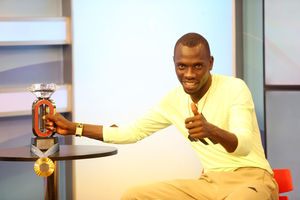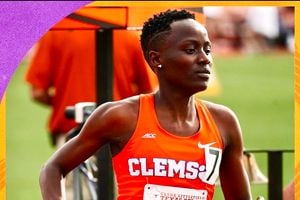
Retired women’s 800m legend Janeth Jepkosgei aka ‘Eldoret Express’.
In her own words, Janeth Jepkosgei’s has found more excitement and fulfilment in coaching than when she was competing as an athlete.
“This is because I am changing someone’s life. When I see Emmanuel Wanyonyi, whom I discovered in a county championship, winning, it makes me feel happy.
“When I see these young ones winning to change the well-being of their families it warms my heart. I am fulfilled when I see the refugee athletes rediscover their worth to compete at the Olympics,” said Jepkosgei.
Speaking on NTV’s Monday night sports show SportOn! hosted by Bernard Ndong and James Wokabi, Jepkosgei recalled how she almost changed citizenship to Bahrain after being left out of Team Kenya several times despite winning at national trials.
Jepkosgei aka “Eldoret Express” recalled with nostalgia her victory against the undefeated Maria Motula of Mozambique, her humbling journey with Athletes Refugee Team and her dream to leave a legacy of athletes excelling in athletics and academics.
The 40-year-old legendary 800m runner also talked about Gender Based Violence pointing out it takes two to tango. She said the boy child should also be protected.
Jepkosgei found it rough transiting to senior levels despite flourishing as a junior where she represented the country in 800m at the 1999 World Athletics Youth Championships, won silver at the 2001 Africa Under-20 Championships and gold at the 2002 World Athletics Under-20 Championships.
She finished second in the Kenyan trials for 2003 World Athletics Championships and went ahead to win the trials for the 2005 World Athletics Championships but was curiously not selected to the national team.
Frustrated after being left out of Team Kenya four times, Jepkosgei went to meet the Athletics Kenya President, the late Isaiah Kiplagat, and informed him of her plans to change citizenship and run for Bahrain.
Jepkosgei says it was towards the end of the 2005 season that she met some guys who were preparing to move to Bahrain and Qatar.
“I had all my papers ready with good money since I had closed my season with victory in Rieti, Italy in August,” said Jepkosgei.
Jepkosgei said that Kiplagat convinced her to shelf the move with the promise she would be included in the World Indoor Championships and Melbourne Commonwealth Games the following year, 2006.
“He told me he was like my father and I understood,” said Jepkosgei, who declined to disclose how much Bahrain had offered her to change citizenship.
Jepkosgei never disappointed at the Melbourne Commonwealth Games as she went on to beat the great Maria Mutola, who was not only fresh from sealing her eighth World Indoor title in Moscow but had won three world titles and one Olympic title.
“I knew I was in good shape because I was training with my coach Claudio Berardelli.” She kicked with 200m.
“I won the race but all the cameras were on Maria. I had gone to celebrate with the Kenyans on the other side and I could not believe I had beaten Mutola,” said Jepkosgei, who again floored the Mozambican at the 2007 World Championships to hand Kenya its first women's world 800m title.
“I remember then sports minister Maina Kamanda giving me a hug together with the late Isaiah. That is when I realized that I had done something big,” said Jepkosgei, adding that she is happy that Kenya is still winning the women’s two lap race with Eunice Sum (2013) and Mary Moraa (2023) claiming world titles.
After taking a maternity break in 2016, Jepkosgei returned to competitive running in 2018 but did not last a year as she moved to coaching.
“It wasn’t a tough decision to make because I was not stepping out of athletics. I was still waking up in the morning, going to the track or following them in long runs and giving out programmes,” said Jepkosgei who says she has found coaching fascinating.
“Coaching involves mental preparations of athletes; it takes more energy than when you are just running. “But I am enjoying right now since I want to see more champions coming up,” said Jepkosgei.
To arm herself well she earned World Athletics Level One and Level Two coaching certifications.
Why the move to coach young people? “I love to grow from zero and discover talents. I love to watch someone improve each year,” said Jepkosgei, who was surprised when World Athletics engaged her to coach the refugee team in 2022.
Jepkosgei said that it was not her first time to handle refugee athletes, having dealt with them during the holiday camps in Kapsabet. “I was happy that someone was watching what I was doing, incorporating education and athletics for young athletes,” said Jepkosgei, who took a team of 37 refugee athletes to the Paris Olympic Games.
The squad participated in athletics, swimming, boxing and breakdance.
Jepkosgei manages both education and athletics programmes at Kakuma Refugees camp and Kapsabet where every weekend they have online classes.
She spoke about the inspiring and sometimes heart-rending stories from the refugee athletes, who ran away from their countries because of war, most without any basic education.
“Some of them are older and one has to start teaching them but I am glad they are now able to present themselves since we started the programme. The challenges they go through can break someone, for instance they can go without food for days,” said Jepkosgei.
She is glad that over 20 youngsters she had handled since 2016 have secured scholarships to the United States of America since 2016 with a number of them later acquiring Masters and PhD degrees.
“Life has to continue after sports and that's why I want lawyers, doctors, engineers, teachers, pilots and IT experts in athletics,” said Jekosgei.
And how did the nickname "Eldoret Express" come about?
Jepkosgei, who is a fan of rugby, says that it’s the Kenya Sevens rugby players Humphrey Kayange and Andrew Amonde among others who nicknamed her during the 2006 Melbourne Commonwealth Games.
“They were debating on what to call me between ‘Kapsabet’ and ‘Eldoret’ but the rugby guys were like we should call this girl ‘Eldoret Express’,” says an amused Jepkosgei.









